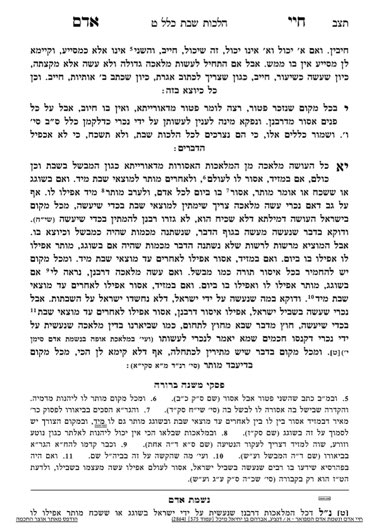Sponsorships for the upcoming Klalim, which discuss the 39 melachos of Shabbos, are available. Please contact Rabbi Reingold for more information at rabbireingold@gmail.com or 301.996.5910
We are continuing in siman 11, discussing the concept of maaseh Shabbos. The Chayei Adam moves to discuss the halachos of maaseh Shabbos of an issur derabanan. The Chayei Adam writes that if the melacha performed was an issur derabanan, if it was done b’shogeig, it is muttar even on Shabbos itself, even for the individual who performed the melacha. This is very different than an issur deoraysa, where it was assur for everyone on Shabbos. If it was performed b’meizid, it is assur for others to benefit until after Shabbos, like an issur deoraysa. However, once Shabbos is over, it is muttar for the individual who performed the melacha as well. There is no din of bichdei she’yaasu, as we have learned (s296).
The Biur Halacha follows this approach as well. But first, he writes that the Pri Megadim disagrees, and holds that the rules delineated for maaseh Shabbos of an issur deoraysa are the same as those for an issur derabanan. Thus, if it was done b’shogeig, it is assur to everyone until after Shabbos; if done b’meizid, it is assur for everyone else until after Shabbos and assur for the person who performed the melacha forever. The Biur Halacha brings a Gemara which seems to run counter to the Pri Megadim’s approach.
We need to understand why shogeig is assur in the first place. The Gemara says that shogeig is assur due to a gezeira by Chazal. Chazal were concerned that if shogeig was muttar, people would perform melacha b’meizid and claim it was done b’shogeig so that they could benefit from it immediately. Therefore, Chazal imposed that the maaseh Shabbos be assur until after Shabbos, so that there is no longer an incentive to claim the maaseh Shabbos was done b’shogeig, since one anyways cannot derive benefit until after Shabbos. This is the opinion of Rav Yehuda, which is followed by the Shulchan Aruch.
If so, when it comes to an issur derabanan, it would be a gezeira l’gezeira to make the maaseh Shabbos performed b’shogeig assur until after Shabbos. Therefore, Chazal did not make a gezeira, and it would be muttar even on Shabbos itself. (Gezeira l’gezeira refers to a gezeira on top of another gezeira. In this case, making a gezeira in a case of an issur derabanan on top of the gezeira on shogeig of an issur deoraysa would be a gezeira l’gezeira. Chazal do not impose “double” gezeiros.)
The Chayei Adam implies that b’meizid, the maaseh Shabbos will be muttar for the individual who performed the melacha as well. The Biur Halacha writes explicitly that thiis the understanding of the Chayei Adam, but has difficulty with it. He suggests that it would be assur forever for the individual who did the melacha, as is the case regarding maaseh Shabbos of an issur deoraysa. He remains with a tzarich iyun on the Chayei Adam.
There are some exceptions to this halacha, in that even by maaseh Shabbos beshogeig of an issur derabanan, it would be assur on Shabbos itself. One example are the halachos of shehiya and chazarah. We will clarify these exceptions in the upcoming shiur, be’ezras Hashem.
Summary
- When it comes to maaseh Shabbos of an issur derabanan, if it was done b’shogeig, it is muttar to everyone even on Shabbos.
- If it was done b’meizid, it is muttar to everyone immediately after Shabbos is over. The Mishnah Berurah disagrees with this, and prohibits it for the individual who did the melacha forever.



